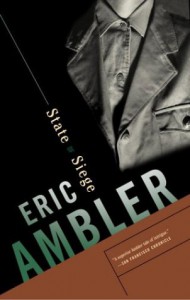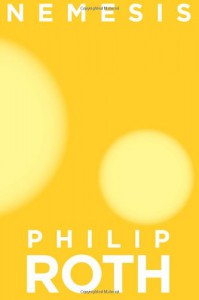Currently reading
Vineland (Classic, 20th-Century, Penguin)
Tristes Tropiques
Richard III
The Dwarf
The Collected Poems of Wilfred Owen
Labyrinths
Giotto to Dürer: Early Renaissance Painting in the National Gallery
Michel Foucault: Beyond Structuralism and Hermeneutics
Gravity's Rainbow
A Gravity's Rainbow Companion: Sources and Contexts for Pynchon's Novel
 An excellent Bernhard... clearer and mellower... there is even a positive character in it (!!). Really 4.5 stars.... But that 'positiveness' does take away just a smidgen... ;-)
An excellent Bernhard... clearer and mellower... there is even a positive character in it (!!). Really 4.5 stars.... But that 'positiveness' does take away just a smidgen... ;-)
 A spoiler alert --
A spoiler alert -- A psychological thriller. For much of this, I felt that the story was a bit too intricate to be quite believable. But I was, in the end, completely won over.
A very long set-up, but well worth the wait for Macdonald fans, of which I am one.
 This book contains a light, an unbearably light…, but profound anatomy of the psychology of totalitarianism in the Age of the Spectacle – and thus is of great interest. It is, moreover, deftly handled. Kundera understands what he is speaking of – he *understands* it. I am quite surprised to find that so many GR reviewers found the book uninteresting or flawed.
This book contains a light, an unbearably light…, but profound anatomy of the psychology of totalitarianism in the Age of the Spectacle – and thus is of great interest. It is, moreover, deftly handled. Kundera understands what he is speaking of – he *understands* it. I am quite surprised to find that so many GR reviewers found the book uninteresting or flawed.Of particular interest is his analysis of ‘kitsch’ – as key to the pathology of modern, spectacular man.
Kitsch (the absolute or “categorical” denial of “shit”), he says in Part Six, “causes two tears to flow in quick succession. The first tear says: How nice to see children running on the grass! The second tear says: How nice to be moved, together with all mankind, by children running on the grass! It is the second tear that makes kitsch kitsch.” (251)
In America today… as soon as one leaves the pebbles of the shore (if that!) nearly all one finds is kitsch.
Strange then – and no doubt deliberate – that a book dedicated to the evisceration of kitsch should nonetheless end with an ending that it utterly kitsch (‘Karenin’s Smile’).
Clearly, one is meant to get the irony; “Karenin [the dog], who was after all a female, had his periods, too. They came once every six months and lasted a fortnight” (-- hardly a spoiler…).
And yet, the dog, as the animal or primitive in man, is not wholly ironic – for he represented man in the idyllic paradisal state…, prior to the appearance of history…, prior to the Age of Narcissism -- that is, before man is man.
In Paradise, time is cyclical… nothing happens… all is rhythmical – when Man is cast off into the endless and futile trajectory of time…, where events ‘accumulate’… man then becomes Man. “The longing for Paradise is man’s longing not to be man.”
But perhaps it is not so simple. After all…, he concedes, “No matter how we scorn it, kitsch is an integral part of the human condition”.
A fine writer – and an important book.
 Powerful book...esp the first half...not just the content, which is raw, but the language and punctuation even that captures brilliantly the maniacal be-bop riot of this heart of darkness ride into the horrid past.... Easy Rider (as, in fact, Sean Flynn quite literally was) comes to Saigon, Khe Sanh, Hue....
Powerful book...esp the first half...not just the content, which is raw, but the language and punctuation even that captures brilliantly the maniacal be-bop riot of this heart of darkness ride into the horrid past.... Easy Rider (as, in fact, Sean Flynn quite literally was) comes to Saigon, Khe Sanh, Hue....
 This one has lost my interest. Either I've burned out on Ambler for the week (3 books in 5-6 days) or it's simply not as good as the others. I think it's probably the latter.
This one has lost my interest. Either I've burned out on Ambler for the week (3 books in 5-6 days) or it's simply not as good as the others. I think it's probably the latter.
 This book is not quite as ambitious as either Passage or Deltchev - but no less masterful for that. Despite a slower beginning (for me), the book picks up and is flawless, once again, in its construction. Clearly Ambler is a man who does not write until he knows what it is he wants to say. How refreshing! and while he chooses to use the style of the political thriller, it is nothing less than the anatomy of man, that "ape in velvet", that he has firmly in his sights.
This book is not quite as ambitious as either Passage or Deltchev - but no less masterful for that. Despite a slower beginning (for me), the book picks up and is flawless, once again, in its construction. Clearly Ambler is a man who does not write until he knows what it is he wants to say. How refreshing! and while he chooses to use the style of the political thriller, it is nothing less than the anatomy of man, that "ape in velvet", that he has firmly in his sights.
 First, a correction - this book is actually 112 pages, not the 107 that some anonymous librarian (kindly) corrected it to last week.
First, a correction - this book is actually 112 pages, not the 107 that some anonymous librarian (kindly) corrected it to last week.A great introduction for very young chess learners.
 Wickely smart..., flawlessly and intricately contructed..., and a truly profound analysis and anatomy of the psychology of tyranny and power. Utterly believable.
Wickely smart..., flawlessly and intricately contructed..., and a truly profound analysis and anatomy of the psychology of tyranny and power. Utterly believable.A masterpiece of the genre.
 All ratings relative to the genre, of course.
All ratings relative to the genre, of course.3.5 stars.
Ambler wrote a series of novels from 1936-1940, then stopped for 12 years, returning to fiction in 1952. This is the last of the early works. Though these early works are considered "Classics", I found this book a shade immature in its technique, compared (at least) to Passage of Arms, which is truly brilliant. The lead character, Graham, is foolish (in a very British way), and so not wholly believable. Because of this, the plot (which hinges on this character) suffers somewhat. But the secondary characters are vivid and, in some cases, compelling. And the finale compensates for any flaws leading up to it. An excellent book for Ambler fans, but not necessarily the best starter book.
 Gordimer has a nuanced intelligence that is quite genuine. And the book is stylistically rich. Still, I found it claustrophobic, the entire story taking place in a tiny and narrow settlement, and the resolution ambiguous and unsatisfying. Others may find this much more to their tastes.
Gordimer has a nuanced intelligence that is quite genuine. And the book is stylistically rich. Still, I found it claustrophobic, the entire story taking place in a tiny and narrow settlement, and the resolution ambiguous and unsatisfying. Others may find this much more to their tastes.
 Read Rain, skimmed the Pool... O.K. If you like this sort of stuff... A bit of melodrama based on a moral code that seems rather remote today....
Read Rain, skimmed the Pool... O.K. If you like this sort of stuff... A bit of melodrama based on a moral code that seems rather remote today....
 This is by far the best edition in English.
This is by far the best edition in English. Jowett is worthless, more a Victorian era paraphrase than a translation, and Cooper et al contains a lot of lousy "updated" translations, though Grube's Republic is in it. Still, nothing compares to Shorey's Republic, which Hamilton prints.
Use this edition.
Water-Blue Eyes
 This seems like a thousand other books. Villar is a good writer. But is he in any way original? hmmmm...?
This seems like a thousand other books. Villar is a good writer. But is he in any way original? hmmmm...?
 A great read -- no review here, but will comment when I've read (soon) Ghost Train..., which is The Great Railway Bazaar redux, 30 years later.
A great read -- no review here, but will comment when I've read (soon) Ghost Train..., which is The Great Railway Bazaar redux, 30 years later.
 This was my first Theroux and, on finishing it, I couldn’t fully judge of the tone of a book that was written near what will likely be the end of his career, after a certain cynicism has taken root. Since then, I’ve read The Great Railway Bazaar (his first travel book) and now a good chunk of Ghost Train.
This was my first Theroux and, on finishing it, I couldn’t fully judge of the tone of a book that was written near what will likely be the end of his career, after a certain cynicism has taken root. Since then, I’ve read The Great Railway Bazaar (his first travel book) and now a good chunk of Ghost Train.First, it has to be said that this book is very NOT-P.C. (to say the least!). Theroux has what often appears to be an open and unapologetic contempt for many of the black Africans he meets and describes -- certainly a contempt for what they’ve made of themselves and of their societies. There is a contempt for the entire African/ThirdWorld AID industry (whose representatives he sneeringly refers to as ‘agents of virtue’), those smug, insulated, liberal do-gooders riding about in their large, white Land Rovers, hanging around the fancy swimming pools of the luxury hotels, never mingling with the people they claim to help, not even willing to lend a hand to a stranded white man in need of a ride, spending wads of OPM (Other People’s Money) not simply in ways that are unhelpful, but in ways (Theroux believes) that are positively harmful. He cites books like The Lords of Poverty and The Road to Hell, as well the opinions of many Africans (black and white) who confirm this bias (he may be right in this; I’m in no position to judge). On the other hand, he shows great sympathy for the white South African and (formerly) Rhodesian farmers, who many of us would tend to view as being reactionary forces. I wouldn’t be surprised if this book brought down upon Theroux’ swampy head a heap of anger – and, indeed, charges of out and out racism.
But it’s not so simple, because he also quite obviously has a deep love and respect for the old African societies he viewed so hopefully in his youth, when he spent 3 years in the Peace Corp in Malawi and had (during the years of his early friendship with V.S. Naipaul) a Nigerian girlfriend. He seems (albeit in his wholly curmudgeonly way) to be motivated not by race-hatred, but more by an absence of white guilt – quite a different thing. So, when people shout out to him, ‘Hey, White Man”…, he gets fed up and says – “Hey, you want me to call you ‘Hey, Black Man’?” and people (that is, Blacks) respond, not surprisingly, in a positive way to this bold assertion of his own rights to individuality. People respect you when you respect yourself.
Theroux is, indeed, quite the cosmopolites – fleeing the artificiality of the developed world, in search of the authentic, of the ‘noble savage’, if you will…, if such remains – and he is an experienced and exuberant libertine (for all his protestations of restraint) for whom there must have been more than a little of the Richard Burton lurking in his wanderings.
Is this racism? Well…, it is a slippery slope, no doubt…
Nor is Theroux an entirely admirable personality. As a writer, even at his best, there is always something of the hack about him. Some of the writing in Safari is particularly cheesy, and his best works, his travel writings (I’ve never read the novels), are largely based on a formula and gimmick. His cynicism and the occasional mawkishness are well known. And his history with Naipaul, for all his self-justifications (Sir Vidia’s Shadow), leaves something to be desired on BOTH sides:
http://www.telegraph.co.uk/culture/donotmigrate/3672064/Patrick-Frenchs-biography-of-VS-Naipaul-Naipauls-friendship-with-Paul-Theroux.html
But it must be said, in reading this late work (pub. in 2002) that Theroux is someone who seems to have grown, and to have grown better and deeper, and more urgent…, which is not often the case with men (women, perhaps, are different), who are more frequently diminished by success and by aging. For all his flaws, in other words, Theroux has increasing been willing to look the beast… the beast of his personal weaknesses, of his mortality, and of his love… nay, his lust for life… a love ultimately doomed by the facts of nature… directly in the eye. And the result is a certain poignancy and beauty that is fully in evidence in this wonderful book.
This book is a redux. Having lived and traveled long ago in Africa, just during the period around Independence, he decided to go again in 2001 (or thereabouts), and to travel alone, without lots of money and without any entourage, by bus, train, walking – each stage of the route dictated by chance – from one end of Africa (Cairo) Xto the other (Cape Town), along the Eastern half, through Ethiopia, Kenya, Zimbabwe, Uganda, Malawai, South Africa, sleeping in cheap hotels or hovels, on busted down rusty buses and trains, basically ‘bumming thru’ Africa’…. And this, without a phone or blackberry, not as a 25 year old or a 34 year old (Great Railway Bazaar), but at the age of 60…!! This was quite feat, as those of you who are in your mere twenties will someday realize.
And what he saw was that Africa, so hopeful in 1972, has become ruinous. Ruinous because of the effects of colonialization; because of the effects of freedom, and corruption, and the profound and dire incompetence of the Africans themselves; because of the AID agencies who build Dams and projects that no one will ever use, instead of helping the Africans thatch their roofs; because of the stupidity both of modernity AND of those who will not be so easily modernized.
His description of the Grand Hotel in the town of Beira, Mozambique (347), a huge colonial skeletal structure facing the Indian Ocean, decrepit, “had been taken over by plunderers and invaders. These homeless people were living in the guest rooms and had cooking fires going on the balconies and had rigged up tends on the verandas. Some were emptying buckets of shit over the rails; their laundry hung limp on strong-up lines. The building was a vast crumbling pile of broken stucco and rusted railings, filled with ragged squatters. Smoke issued from most of the rooms. I supposed that for some people this looked like the past, but to me it had the haunted look of a desperate distant future, an intimation of how the world would end, the Third World luxury resorts turned into squatters’ camps.” (Cp. the collapse and ruin of Mbeya, in Tanzania, at 270f.)
Or the story of the Wagogo, living in the hot, dusted, ruined plains of Tanzania, 30 of them huddled under the shade of a single tree to escape from the blasted rays of the midday sun – but who never thought, to escape from this, simply to plant a few extra trees...
At any rate – this is a powerful and moving book, despite its flaws.













